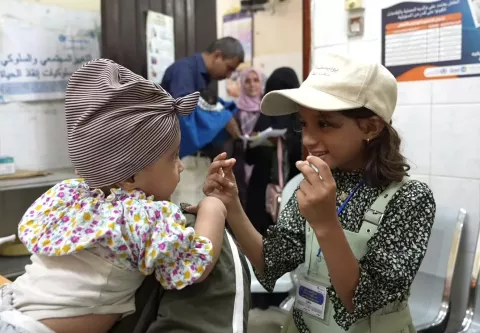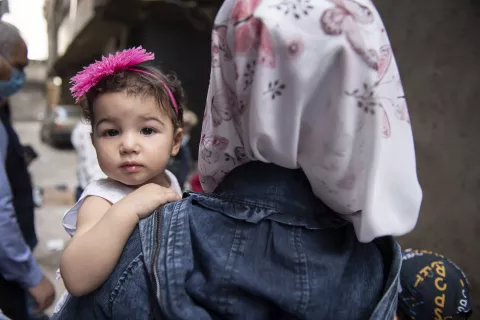Sudan: Urgent plea from UNICEF to allow vaccination in areas of conflict
SUDAN: UNICEF CALLS ON ALL PARTIES TO CONFLICT TO DARE TO CARE, TO MAKE CHILDREN A TOP PRIORITY
By Martin Plaut
With Sudan’s President’s recent call for national dialogue, renewed negotiations between the Government of Sudan and the Sudanese People’s Liberation Movement North (SPLM-N), and efforts to bring all parties together for peace in Darfur; UNICEF urges all parties that primary consideration be given to the needs of millions of children living in conflict affected areas in Sudan.
For years, the majority of these children have remained without access to quality care and protection services.
At present, there is a measles outbreak in Yida camp in neighbouring South Sudan and conditions are rife for polio to re-emerge as populations live in make-shift conditions. Yida camp is where the majority of Sudanese from South Kordofan and Blue Nile are fleeing to and the humanitarian imperative to protect the child population in these areas is urgent.
In South Kordofan and Blue Nile states alone, 165,000 children under five have gone without routine immunization, leaving them at risk of contracting polio and other vaccine preventable diseases. More than 500,000 children remain at risk of contracting measles.
About 200,000 children are out of school and will suffer a backlog in academic progress, not to mention being deprived of a sense of normalcy during a long period of their childhood.
In Darfur, about 175,000 children are suffering from severe acute malnutrition, jeopardizing their chances to survive and thrive. More than 2 million children have no access to clean water and over 4.2 million are without access to sanitation services, leaving them vulnerable to easily preventable water borne diseases.
Millions of children are growing up in Sudan, deprived of hope. All because of conflicts that seem to never end.
The sheer number of conflicts in Sudan, including the protracted nature of some of them, makes you wonder
Who cares?
At UNICEF, we dare to care and we will never give up hope. Together with our partners, we are ready to deploy support teams and supplies with 48 hours’ notice, whenever and wherever conflicting parties decide to silence their weapons and embrace peace. Sudan’s children cannot and should not wait any longer to enjoy the care and services that should be part of everyone’s childhood.
Sudan is at a cross roads, and attention to the many persistent crises here is crowded out by massive crises in the region, notably in South Sudan, Central African Republic and Syria. But we cannot afford to fail the children of Sudan. Sudan is a complex environment and merits our focused attention.
Cause for optimism, many small lights on the horizon
While challenges abound for children in Sudan, there is also evidence of progress for children:
- Child victims of violence now have a fighting chance of being heard and rehabilitated. The Family and Child Protection Unit of the Sudanese Police Force has integrated specialist services for child victims of violence, abuse and exploitation as well as children in conflict with the law. This unit also integrates the work of the police, child courts, prosecution and social work.
- Children with disabilities have gone from invisible to visible. A national strategy for inclusion of children with disabilities has been launched by the Ministry of Education, setting out concrete steps for effective inclusion of these vulnerable children.
- Children are benefitting from an improved health system. The Ministry of Health has added the PCV (pneumococcal conjugate vaccine) to their routine immunization program which will help protect children against pneumonia, a leading childhood killer.
- Domestic production of commodities is shaping up. Sudan has its own PlumpyNut factory, producing ready-to-use food for treatment of malnutrition; evidence of evolving national capacity to produce life-saving commodities for children.
- Increasingly, children are living in healthier environments. In towns and villages across the country, community-led approaches to total sanitation are catching on; communities are taking charge of their own hygiene needs and behaviours; stamping out open defecation and its negative impact on the health of their members, especially children.
- Academia is standing up for children. Two universities in Khartoum have partnered with UNICEF to run innovation labs where students will develop fit-for-purpose, needs-driven products and processes that will help to improve social service delivery for children.
In the midst of profound challenges, the contours of a society organizing to take care of its child population are prominent.
More than anything, I am flabbergasted at the resilience and can-do spirit of the ordinary Sudanese men and women. Their resolve is a constant source of inspiration for us at UNICEF. They keep us on our toes, trying to do our level best to drive results for children in Sudan.
The challenges are tough.
In addition to the burden of protracted conflict; the food, fuel and finance crisis has hit Sudan, and children are likely to bear the brunt of financial austerity measures; this is what we have seen in other countries. The Government of Sudan cannot afford NOT to invest in its children. Nor can the international community. Sudan’s children cannot wait.
My appeal is for the international community to stand by Sudan and support all forces for positive change in this country, first and foremost by investing in children. In Sudan, my appeal goes to the Government Sudan and all parties to on-going conflict to put an end to the fighting and put children front and centre of a national agenda for development.
Join us in daring to care for the growing generations in Sudan.
Mr. Geert Cappelaere, UNICEF Representative in Sudan. 25 February 2014
Media contacts
About UNICEF
UNICEF promotes the rights and wellbeing of every child, in everything we do. Together with our partners, we work in 190 countries and territories to translate that commitment into practical action, focusing special effort on reaching the most vulnerable and excluded children, to the benefit of all children, everywhere.
For more information about UNICEF and its work for children, visit www.unicef.org.



